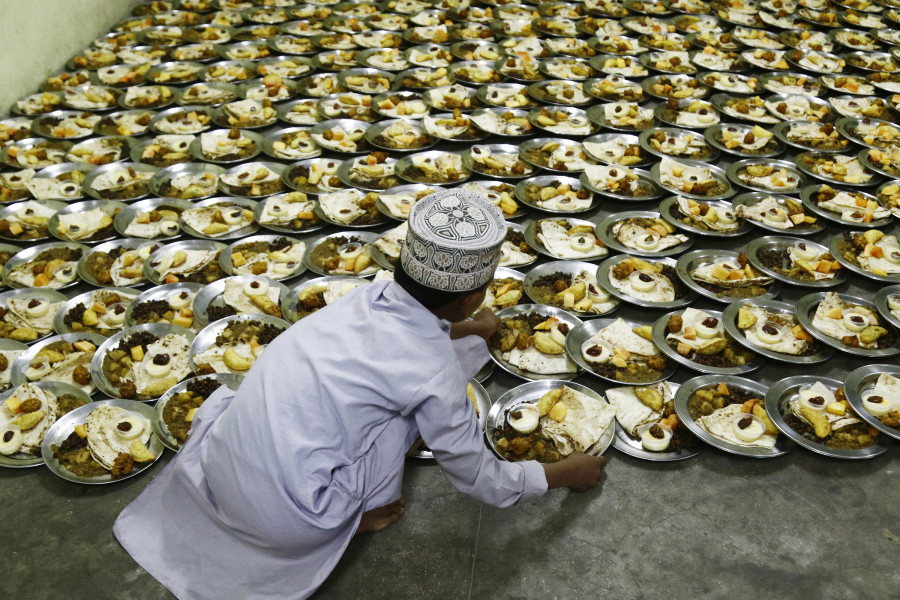Culture & Lifestyle
Here’s how Muslims in Kathmandu feast during Ramadan
During the month of Ramadan, Muslims do not eat or drink during daylight hours, but once the sun is down feasts await them
Alisha Sijapati
It’s 6:30 pm on a cloudy Sunday evening. Mohammed Allahuddin looks out towards the dark skies from the Kashmiri Jama Masjid in Ghantaghar, and murmurs, “It will rain heavily tonight.” If it rains tonight, the sun may shine a little too bright tomorrow. And Allahuddin, a vegetable vendor, will have a tough time walking the streets of the Capital in the blistering heat on a fasting body.
It is the month of Ramadan, and for Muslims it is time for their biggest celebration. It is also a time for them to fast for the entirety of the ninth month of the lunar calendar—a month in which it is believed that the Quran was revealed to prophet Muhammad.

At the gates of the masjid, Allahuddin performs his wudu—a ritual that requires him to cleanse his feet, hands and face—before entering the masjid’s make-do iftar hall. By the time he completes washing himself, thunderbolts strike and it starts to drizzle. Allahuddin rushes to join the long queue outside the hall, where everyone is waiting for the iftar party to begin at 6:47 sharp, after the sun sets. An evening meal is in order, in which all Muslims participate to end their day’s fast.
Inside the large hall, helpers at the masjid have laid out 300 plates—a number that changes every other day depending on the number of people who visit. A variety of food items are on the plates—rumali roti, chana, keema samosa, aalu keema, pakoda, fruits. For dessert they have firni, a dish made of sweet rice, and khajur, a type of date, served with some sherbet.

The men slowly start filling in the empty seats laid out in front of the plates. Then they recite the namaz, just as the mollahvi sahab recites ‘Allah-uh-Akbar’ simultaneously on speakers. Before the men start their meal, they chant in unison: ‘Bismillah’, in the name of God.
As Allahuddin digs in, with hundreds others, Mohammed Israil looks on from afar, face filled with content. He has been preparing iftar and sehri—the two meals people are allowed to eat before sunset and sunrise respectively—at the Kashmiri Masjid since 1982. Israil, fasting himself, will continue preparing meals for his people every single day—until the last day of Ramadan, which falls on June 4 this year. He heads a team of five who cook all day—starting from 10.30 am—with a target to finish at five in the evening, an hour before iftar.

During this month, Muslims do not eat or drink during daylight hours because fasting is one of the five pillars of Islam. The other pillars are shahadah, which is the declaration of faith; zakat, or almsgiving; salat, the five daily prayers; and the hajj, the pilgrimage to Mecca.
“The fasting process might seem tough for people of other communities, as disciples are constrained to eat only during dawn or sunset, and not even have a drop of water the rest of the day,” says Israil. “But for us, the month-long fasting has become a welcome ritual, a process of transition, of cleansing our bodies from impure consumption.”

Ramadan is a month to instill self-discipline and empathy. And the act of fasting is symbolic of that spirit. It is said to redirect the devotee’s heart away from worldly pleasures and bring him closer to God.
All the eight items offered as iftar have significant importance, says Israil. “You break your fast with khajur because Prophet Muhammad also broke his fasts with khajurs.” It is also auspicious to start with something sweet, he says.
The other items, such as rumali roti, chana, keema samosa, aalu keema and pakoda are rich in carbohydrates and protein, which will ensure that the person fasting will have enough energy to keep them going throughout the day.
Sehri meals are usually limited to sewai porridge, eggs, fruits, milk, because most people don’t have much of an appetite when they have to wake up in the middle of the night. But for the pre-fast meal, one can also eat the things one eats as iftar as well, as long as one does not consume anything that is artificially produced, says Israil.
Iftar and sehri meals include a generous portion of fruits, juices, meats and sugar so that bodies get enough nutrition and energy, he adds.
Apart from the regular eight items presented on a plate during iftar, special mutton and veg biryani are also prepared on Fridays at the masjid.
“We want to offer these people with a special feast so that they can celebrate rather than just fill their stomachs with food,” he says.

Bimmi Banu, a banker, says sehri and iftar are enough to keep her full for the entire day. Her two meals, which she makes at home, consists of rotis, vegetables, sewai, khajur, sherbet, among others.
“It is not as difficult as people make out to be. In fact, it’s like detoxing our bodies too. It’s also a great way to lose some weight: you lose at least five kilos in a month,” says Banu.
“The fasting, and then the feast that follows, is a way to make people realise that at the end of the day everyone is equal,” says Banu.
Back at the masjid, Allahuddin is ready to go home, grateful for a nourishing meal. “No matter what tomorrow brings, tonight I will sleep well,” he says. “I have successfully completed another day of fasting, and it makes me feel closer to God.”




 9.83°C Kathmandu
9.83°C Kathmandu

.jpg&w=200&height=120)













